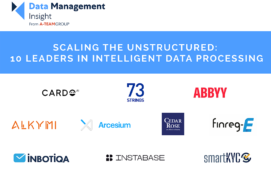Creating a cognitive enterprise is within reach and could ease the regulatory burden, increase the efficiency of data management, and improve decision making. Discussing the use and potential of cognitive technologies at A-Team Group’s recent Data Management Summit in New York, Inderpal Bhandari, global chief data officer at IBM, set out IBM’s view of cognition and described some use cases of the company’s Watson system.
Bhandari said IBM defines a cognitive system as one that is expert in its domain and supports natural forms of expression such as communication with humans. The system should be educated by humans rather than programmed, evolve its knowledge and become smarter and speedier, and therefore augment user decision making.
Noting the use of IBM’s Watson cognitive system for oncology all around the world, and answering the question of why organisations are implementing the technology now, Bhandari said: “It would take doctors 160 hours a week to keep up with medical literature. This sort of scenario is true in any profession where there is a data explosion. Cognitive technology can help you keep up and make better decisions.” Capital markets regulation could be a case in point here, he suggested.
Themes to consider when planning cognitive solutions include the use of unstructured data and more external data, as well as internal data. Bhandari commented: “About 80% of organisations’ data is unstructured and never used for decision making. This needs thinking about. External data such as news feed and social media also need to be leveraged.”
Looking at cognitive technology for the enterprise, Bhandari noted that data management typically involves thousands of experts in many domains and functions, and is a process requiring human judgement. He cited the example of data classification and the need, perhaps, to classify whether clients are government owned. This, he said, requires human judgement, but can be skewed by people in different parts of the enterprise, such as sales and legal, classifying clients with different intent in mind. Intelligent systems like Watson, he suggested, can improve classification by relating datasets in real time.
Bhandari pointed to other use cases of the technology, including preparation processes for new products that are now very manual, supply chain optimisation based on an understanding of the weather or global or political unrest, and a connected cockpit using weather data collected in real time and used by airlines to avoid delays caused by weather.
He concluded: “As the organisational memory of a cognitive system is filled, the system becomes more accurate and efficient. An intelligent system leads users to required data.”
Subscribe to our newsletter




